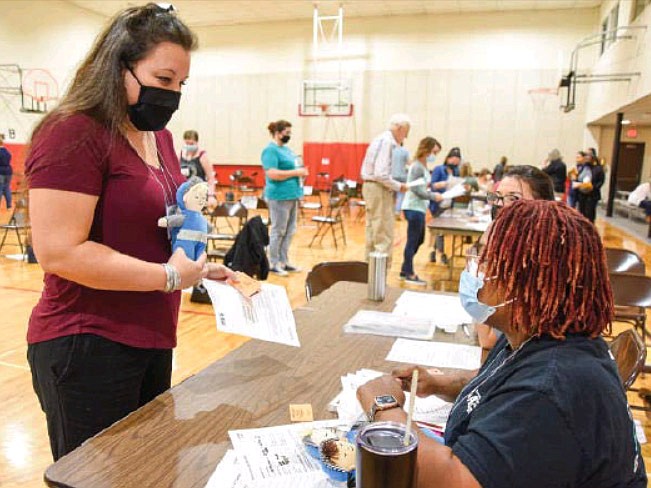There are challenges someone living in poverty can anticipate and many they can't.
They can try every month to save enough money to pay the rent, but an illness or vehicle breakdown can be devastating to their plans.
Just getting by - month-to-month - is stressful.
Capital City Court Appointed Special Advocates (CASA) on Tuesday presented "Rethink Poverty," a simulation intended to demonstrate realities of poverty in Jefferson City. The simulation is an interactive immersion experience that sensitizes community participants to realities of poverty, according to the Community Action Poverty Simulation website.
Fifty-six people signed up for Tuesday's simulation, held at the First Baptist Church Activities Building, 107 Monroe St., said Gina Clement, CASA executive director.
Each played a role in a family, as participants simulated a month of living on a low income.
Central Missouri Community Action (CMCA) uses federal Community Service Block Grants and community support to help clients with employment, education, housing, nutrition, emergency services and health, and to better use available income. It serves eight counties in Central Missouri - Audrain, Boone, Callaway, Cole, Cooper, Howard, Moniteau and Osage. It also provides Head Start services in Benton, Hickory and Morgan counties.
CMCA brought in volunteers to help with Tuesday's exercise.
During the exercise, participants are expected to meet basic needs, like food, shelter, clothing and education, by using available resources. They must find ways to pay mortgages or rent, provide their families with clothing and medicine, and meet transportation needs.
When the simulation ends, participants turn in evaluations of the event. The evaluations provide some insight into how challenging it can be for someone to learn what resources were available to them and how to assess them.
Stefani Thompson, CMCA community organizer in Cole County, said the exercise helps break down the myths people have about poverty.
Tuesday's participants came from Community Health Center of Central Missouri, Missouri Department of Social Services, CASA, Transformational Housing and other volunteers who work for faith-based organizations, Thompson said.
"Some faith-based community members from Transformational Housing who are training to be volunteers, who will be matched up with tenants in their housing that they open," she said. "They just want to get all the education that they can about what it's like to live in poverty."
CMCA hopes to do another simulation at some point, and to invite city, county and state officials, legislators and others to become involved, she continued. That may occur sometime after new information kits for the simulation are released in October.
Groups or employers who would like more information about hosting an exercise should contact Thompson by email at [email protected] or call 573-635-4480.
Verlee Hitzhusen, a volunteer for Transformational Housing, said she felt she had an understanding of poverty before the simulation. She had worked as an educator at a low-income school her entire life. She worked with Habitat for Humanity.
"So, I felt like I had some understanding, but this event really made it concrete for me," Hitzhusen said. "The frustrations of trying to have your needs met - all the different offices you need to go to."
Hitzhusen said she had the role of a young woman with a small child. She had a male partner who worked. While he was working, she went from resource to resource trying to pay bills.
"I couldn't get a job. But, I didn't even have time to apply for a job," she explained.
Transportation was a big challenge.
"The time it took to move from agency to agency," she said. "The waiting that you had to do. It's like the whole day is taken up just trying to go to different locations.
"It was interesting to see how you relied on other participants for ideas - tried to help each other out."
Participants learned from each other that the adults just didn't have time to communicate, she continued.
"You're just working so hard," she said. "You didn't have time to do family stuff."

